

Michelle or Mandy? Nathalie, or maybe Delilah? The great love songs of the last century have been a source of inspiration for many parents around the world. Thousands of love songs have influenced us over the years and served as the soundtrack through the highs and lows of our lives. But how many of them influenced us to such an extent that they inspired us to choose a name for our newborn babies?
On the occasion of Valentine’s Day, the MyHeritage Research team decided to investigate which love songs that became international hits dramatically influenced baby naming trends. The results are fascinating! This comprehensive research is based on data from family trees in the MyHeritage database as well as official statistical data from the U.S., U.K., and France’s Bureau of Statistics.
Search marriage records for free on MyHeritage — special for Valentine’s Day until February 17!
Delilah (from “Hey There Delilah” / Plain White T’s)
The name Delilah saw a significant increase in popularity in both the U.S. and England and Wales after the release of “Hey There Delilah” by the Plain White T’s in 2006.
There are actually at least a dozen songs named “Delilah”, including one by the Cranberries (1999), one by Queen (1991), and Tom Jones’s huge hit from 1968, which was actually a violent song about the cruel, dark side of love. However, the only one that seemed to move the needle when it comes to baby naming was the love song written by the Plain White T’s guitarist, Tom Higgenson:
Hey there, Delilah
What’s it like in New York city?
I’m a thousand miles away
But, girl, tonight you look so pretty
Yes, you do
Times Square can’t shine as bright as you
I swear, it’s true
Higgenson’s inspiration was Delilah DiCrescenzo, a professional steeplechase runner, introduced to him by a common friend a few years prior to the song’s release. Higgenson said in one of his interviews, “I thought she was the most beautiful girl I had ever seen… I told her, ‘I have a song about you already.’” There was actually no song yet, and Higgenson’s attempt to woo Delilah DiCrescenzo didn’t work. However, the two stayed in touch and DiCrescenzo even joined the group for the 2008 Grammy Awards, when they were nominated as song of the year and best pop performance by a group.
The Plain White T’s released the song in May 2006, and it took “Hey There Delilah” a year to become a huge success. In July 2007 it reached #1 on the Billboard Hot 100.
Simultaneously, the name’s popularity blasted to no less impressive heights. Delilah wasn’t a popular name at its baseline: its highest rank since 1900 never crossed #500. In 2006, the name Delilah ranked #547 in the U.S., with 539 American baby girls named Delilah.
Everything changed in 2007 after the song became popular. From 2006 to 2008, Delilah’s popularity in the U.S. increased by 223%, and the name has seen a fairly consistent increase in popularity ever since. In 2007 the name ranked #297: 1,136 baby girls were named Delilah that year. In 2008, it rose to #193, and in 2012, it rose to #154. In 2016 — 10 years after the song’s release — the name Delilah ranked at #115, with 2,735 baby girls named Delilah.
The trend continues to this day: according to the United States Social Security Administration (SSA), in 2022, the name Delilah ranked at #58 with 3,853 baby girls named Delilah. The overall increase in popularity of the name in the U.S. since the song’s release up to the end of 2022 is 615%!
The “Delilah effect” was felt not only all over the U.S., but also across the pond in England and Wales. In 2006, the name Delilah ranked #816 in England and Wales. Only 37 baby girls were named Delilah.
But like in the U.S., everything changed in 2007. The name jumped up to #504 with 76 baby girls named Delilah — twice as many as the previous year. In 2008 the name rose to #408. Overall, between 2006 and 2008, Delilah’s popularity in England and Wales increased by 184%.
And it didn’t stop there. In 2012, it was at #238. In 2016, 10 years after the release of the song, the name Delilah ranked #142 with 399 baby girls named Delilah in England and Wales — a tenfold increase compared to the previous decade!
As in the U.S., the trend continues in England and Wales, and according to the Office for National Statistics, the name Delilah ranked #50 in 2021, with 981 baby girls named Delilah. The overall increase in popularity of the name in England and Wales since the song’s release up to the end of 2021 is a staggering 2,551%!
Mandy / Barry Manilow
Oh, Mandy
Well, you came and you gave without taking
But I sent you away
Oh, Mandy
Well, you kissed me and stopped me from shaking
And I need you today
Oh, Mandy
I’m standing on the edge of time
I’ve walked away when love was mine
From the moment “Mandy” came out, it was clear that it was going to be a hit. Barry Manilow’s song was released in October 1974 and hit #1 on the Billboard Hot 100 soon after, in January 1975.
The impact on the name’s popularity in the U.S. was immediate and extremely dramatic:
In 1973 Mandy ranked at #473, with 384 baby girls who were given this name. But from 1974 to 1975, when the song was released, the popularity of the name Mandy increased by 508%! In 1975, the name ranked at #106: 2,710 baby girls were named Mandy. In the following three years, the name remained extremely popular, ranking at #100 in 1976, #94 in 1977, and #96 in 1978.
After these peak years, we see a steep decline in the name’s popularity. By 1988, it ranked #322, and by 1998 the name Mandy wasn’t even ranked on the top 1000 girls’ names, though it did rise again to #939 the following year.
Mandy was seen last in the top 1000 girls’ names in 2005, ranking #922, with only 270 baby girls named Mandy, representing 0.013 percent of total female births that year.
Angie / The Rolling Stones
Angie, I still love you baby
Everywhere I look I see your eyes
There ain’t a woman that comes close to you
Come on baby dry your eyes
“Angie” by The Rolling Stones was released in August 1973 and soared straight to the top of the U.S. Billboard Hot 100. Like most of the Stones’ songs, “Angie” was written by Mick Jagger and Keith Richards.
The identity of the “Angie” who inspired the song was not clear. It was widely speculated either as David Bowie’s first wife, Angie Bowie (Mary Angela Barnett), or Richard’s daughter, Angela. However, there was probably no real Angie behind the song. According to Richard’s autobiography, the name Angie popped into his head while he was in Switzerland, detoxing from his heroin addiction. Whatever the source of inspiration, the effect on naming trends was clear: from 1973 to 1975, the popularity of the name Angie jumped by 97.5% in the U.S.
Examining the most popular given names to babies in the U.S. since 1920, we found that the only decade in which the name was among the 200 most popular names in the U.S. was the 1970s, ranking as #193, and nowhere close to other decades from 1880 to now.
In 1972, Angie ranked at #260, with 1,016 baby girls named Angie. In 1973, Angie ranked #254, and in 1974, the year after the song was released, it jumped up to #170 with 1,590 baby girls being named Angie. The name peaked in 1975 at #140 in the charts — 1,947 baby girls were named Angie.
The name’s popularity decreased drastically towards the end of the 1970s, and even more during the 1980s. In 1985 — only 10 years after it had peaked — the name ranked at the low number #476 with only 442 girls named Angie. In 2022 the rank for Angie was #719, with 405 baby girls named Angie.
Michelle / The Beatles
“Michelle,” one of the Beatles’ greatest hits, was an immediate success upon its release at the end of 1965. The song was saturated with love, combining English and French:
Michelle, ma belle
These are words that go together well
My Michelle
Michelle, ma belle
Sont les mots qui vont très bien ensemble
Tres bien ensemble
I love you, I love you, I love you
That’s all I want to say
Until I find a way
I will say the only words I know that you’ll understand
The name Michelle became as huge a hit as the song in the U.S. While it already ranked #23 in 1964 and #18 in 1965, between the end of 1965 and 1967, its popularity increased by 90%. Michelle became one of the top 10 girls’ names in the U.S. and remained there for 14 years in a row, ranking as #2 in 1968 and 1969.
In England and Wales the name Michelle didn’t rank among the 100 girls’ names throughout the first half of the 20th century. In 1964, it ranked #31, and a decade after, in 1974 Michelle ranked #7. In 1984, the rank dropped #18, and from then on, it dropped off the chart of the 100 top girls’ names.
What’s really interesting is what happened in France. The name Michelle in France was popular even before the release of the song, peaking in 1945 as one of the most popular names for boys (Michel) and girls (Michelle).
But the Beatles’ hit, despite the distinctly French flavor of the song, actually seems to have had the opposite effect in France. Perhaps the French saw how their popular name became an international cliché and decided to choose another name for their newborn children.
Nathalie / Gilbert Bécaud and Nathalie / Julio Iglesias
The name Nathalie enjoyed a baby name boost by not just one song, but two! The first was “Nathalie” by Gilbert Bécaud, released in February 1964. From 1963, before the song’s release to 1965 when it ranked as the no. 1 girls’ name in France, its popularity increased by 142%.
Nathalie was a popular name before the song’s release, ranking #34 in 1960, #19 in 1961, #13 in 1962, and #7 in 1963. In 1964, the year of the song’s release, it ranked #2, and between 1965 and 1971 — for 7 years in a row — Nathalie was the #1 most popular baby girl name in France, with 30,292 girls named Nathalie in 1965 and 22,674 in 1971.
Starting in 1972, there was a slow decrease in popularity: from 1972–1973 it was #2, from 1974–1975 it was #3, in 1976 it was #4, and in 1977 it was #5. It dropped to #9 in 1978. By 1980, it was down to #15; over the next 5 years, it dropped to #33; and by 1990, it was down to #95.
From 1991 until today, the name Nathalie has remained below the top 100 most popular girls’ names in France.
The original song, with lyrics by Pierre Delanoë, was released with many versions and adaptations over the years, but none of them prevented the sharp decline in the name’s popularity in France. When another love hit with the same name, “Nathalie” by Julio Iglesias — this time in Spanish — was released in October 1982, the drop in the name’s popularity in France became steep.
However, in other countries, most significantly the U.S., a completely opposite trend was observed. Bécaud’s Nathalie didn’t show any significant effect in the U.S., but Iglesias’s Nathalie certainly did. After the song’s release, the increase in the name’s popularity jumped in 224.5%, from 1934 (when it was last on the top 1000 names) to its comeback in 1983.
In 1982 the name Nathalie did not even appear in the top 1000 girls’ names in the U.S. It was last seen in the top 1000 list way back in 1934, ranking at #982, with only 49 baby girls given the name across the U.S. In 1983 Nathalie enjoyed a resurgence in the U.S., ranking at #935 thanks to 159 newborn American girls given that name. Then, in 1984 Nathalie rose to #810 (195 baby girls), and in 1988 it jumped up to #650 (301 baby girls). The name peaked in the U.S. a decade later in 1998: Nathalie ranked #445 that year with 581 baby girls given the name.
Aline / Christophe
French artist Christophe released a romantic ballad called “Aline” in the summer of 1965, and the name Aline saw a significant increase in popularity that year: a 107% increase from 1964 to 1966. There was another significant increase after Christophe re-released the song in 1979: from 1978 to 1988, the popularity of the name increased a further 99.5%.
In summary, our research illustrates a clear link between popular songs and the frequency of baby names inspired by them. Songs like “Angie,” “Mandy,” “Hey There Delilah,” “Aline,” “Nathalie,” and “Michelle” have all left their mark on naming trends. It’s fascinating to see how cultural phenomena, particularly music, can influence the decisions parents make when naming their children. What future hits might shape the naming conventions of future generations? We’ll have to wait and see!
Discover the love stories of your ancestors in our marriage records — free for Valentine’s Day!
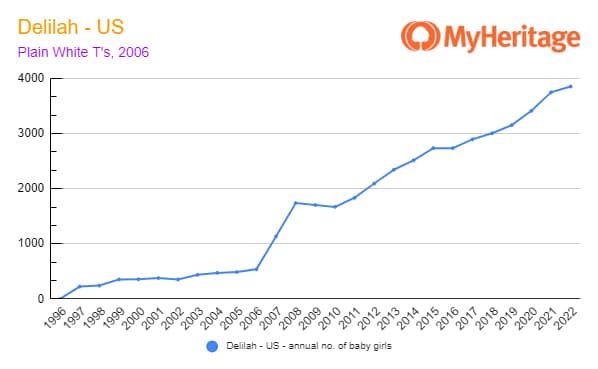
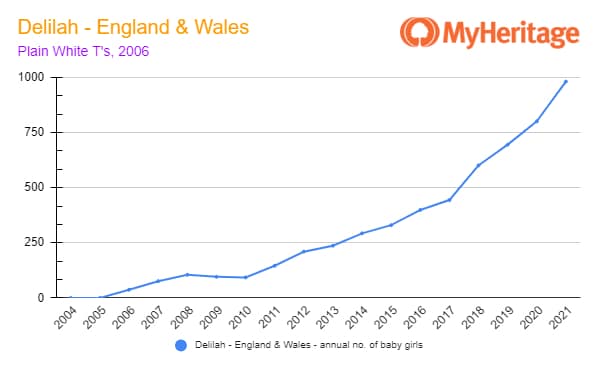
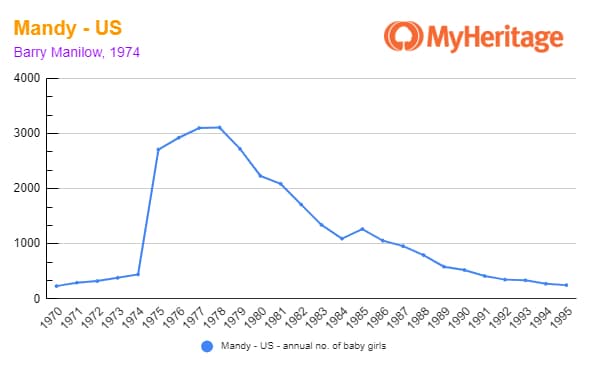
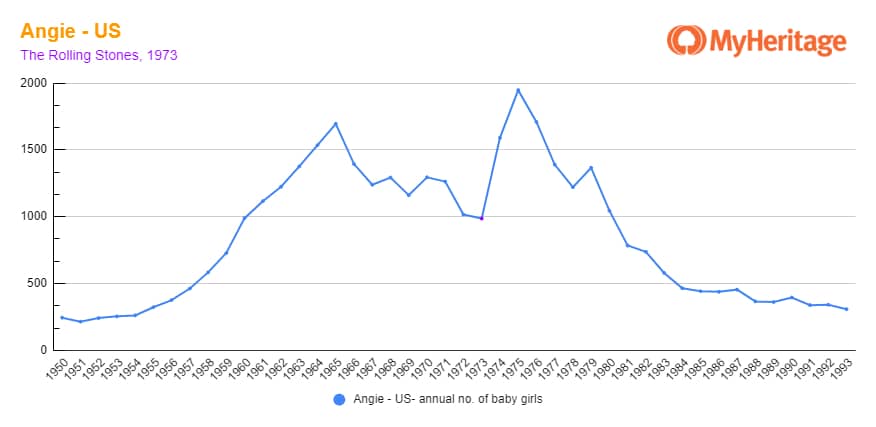
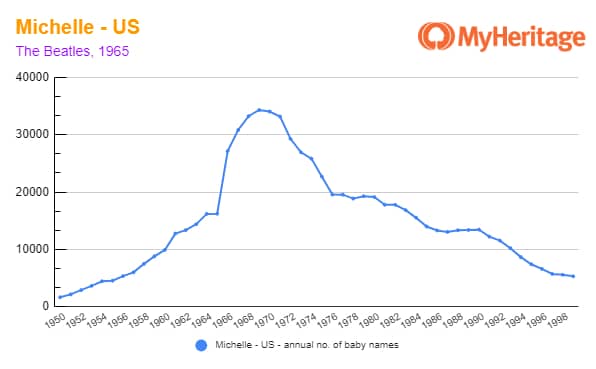
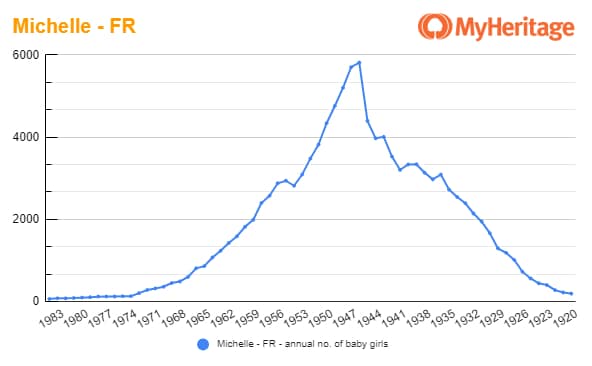
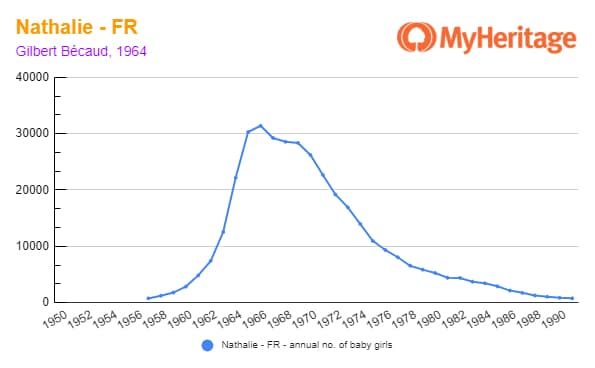
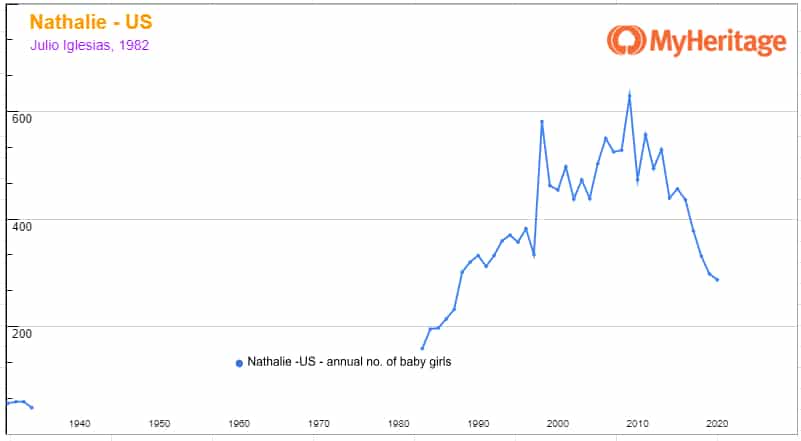
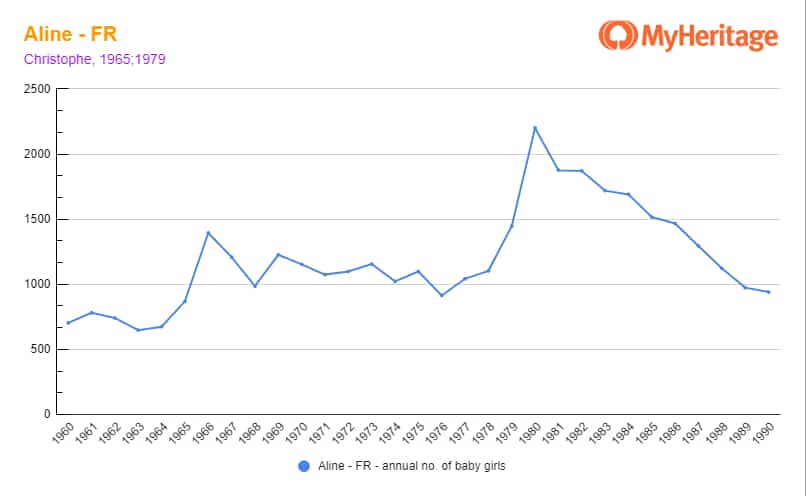










Carolyn (Dolson) Lain
April 12, 2024
This is an interesting article. It must have taken quite a while to gather and correlate all those statistics. Without a doubt the MyHeritage team is the best.